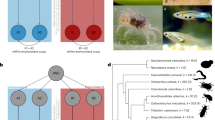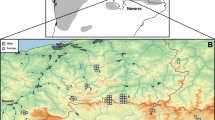Abstract
Background:
Speciation corresponds to the progressive establishment of reproductive barriers between groups of individuals derived from an ancestral stock. Since Darwin did not believe that reproductive barriers could be selected for, he proposed that most events of speciation would occur through a process of separation and divergence, and this point of view is still shared by most evolutionary biologists today.
Results:
I do, however, contend that, if so much speciation occurs, it must result from a process of natural selection, whereby it is advantageous for individuals to reproduce preferentially within a group and reduce their breeding with the rest of the population, leading to a model whereby new species arise not by populations splitting into separate branches, but by small inbreeding groups “budding” from an ancestral stock. This would be driven by several advantages of inbreeding, and mainly by advantageous recessive phenotypes, which could only be retained in the context of inbreeding. Reproductive barriers would thus not arise passively as a consequence of drift in isolated populations, but under the selective pressure of ancestral stocks. Most documented cases of speciation in natural populations appear to fit the model proposed, with more speciation occurring in populations with high inbreeding coefficients, many recessive characters identified as central to the phenomenon of speciation, with these recessive mutations expected to be surrounded by patterns of limited genomic diversity.
Conclusions:
Whilst adaptive evolution would correspond to gains of function that would, most of the time, be dominant, the phenomenon of speciation would thus be driven by mutations resulting in the advantageous loss of certain functions since recessive mutations very often correspond to the inactivation of a gene. A very important further advantage of inbreeding is that it reduces the accumulation of recessive mutations in genomes. A consequence of the model proposed is that the existence of species would correspond to a metastable equilibrium between inbreeding and outbreeding, with excessive inbreeding promoting speciation, and excessive outbreeding resulting in irreversible accumulation of recessive mutations that could ultimately only lead to the extinction.
Similar content being viewed by others
Article PDF
Author information
Authors and Affiliations
Corresponding author
Rights and permissions
About this article
Cite this article
Joly, E. The existence of species rests on a metastable equilibrium between inbreeding and outbreeding. Nat Prec (2011). https://doi.org/10.1038/npre.2011.5003.4
Received:
Accepted:
Published:
DOI: https://doi.org/10.1038/npre.2011.5003.4



